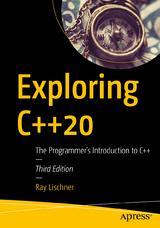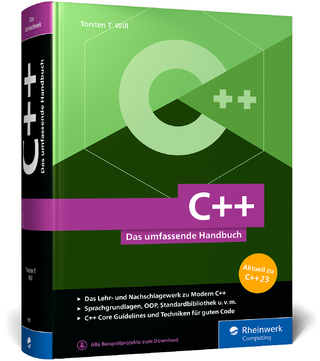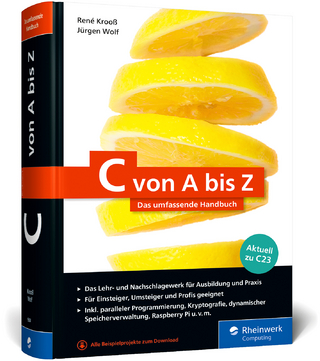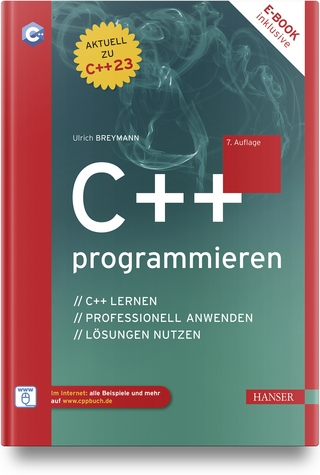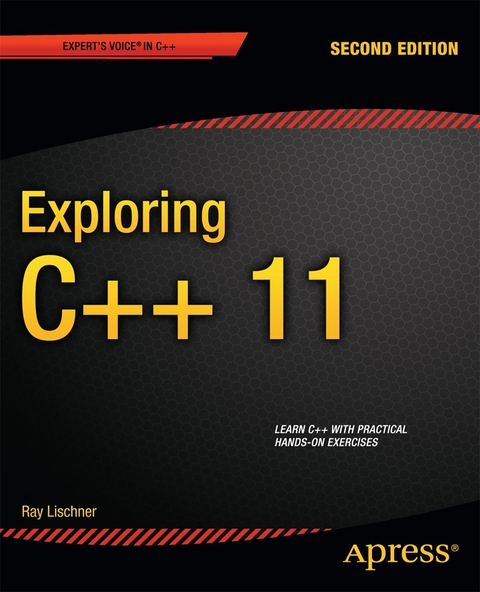
Exploring C++ 11
Apress (Verlag)
978-1-4302-6193-3 (ISBN)
- Titel erscheint in neuer Auflage
- Artikel merken
C++ can be a complicated language. Writing even the most straight-forward of programs requires you to understand many disparate aspects of the language and how they interact with one another. C++ doesn't lend itself to neat compartmentalization the way other languages do. Rather than baffle you with complex chapters explaining functions, classes and statements in isolation we’ll focus on teaching you how to achieve results. By learning a little bit of this and a little of that you’ll soon have amassed enough knowledge to be writing non-trivial programs and will have built a solid foundation of experience that puts those previously baffling concepts into context.
In this fully-revised second edition of Exploring C++, you’ll learn how to use the standard library early in the book. Next, you’ll learn to work with operators, objects and data-sources in increasingly realistic situations. Finally, you’ll start putting the pieces together to create sophisticated programs of your own design confident that you’ve built a firm base of experience from which to grow.
Ray Lischner has a bachelor's degree in computer science from Caltech and a master's in computer science from Oregon State University. He worked as a software developer for a dozen years, at big and small companies across the U.S., using PL/I, C, C++, Delphi, Smalltalk, and various assembly languages on both large and small systems. He has been self-employed as a consultant, trainer, and author for the last 10 years. Ray taught computer science at Oregon State University for several years and specialized in teaching introductory computer programming. He taught courses in C and C++ and software engineering.
Part 1: The Basics - Honing your tools
Part 1: The Basics -Reading C++ Code
Part 1: The Basics -Integer Expressions
Part 1: The Basics -Strings
Part 1: The Basics -Simple Input
Part 1: The Basics -Error Messages
Part 1: The Basics -For Loops
Part 1: The Basics -Formatted Output
Part 1: The Basics -Arrays and Vectors
Part 1: The Basics -Incrementand Decrement
Part 1: The Basics -Conditions and Logic
Part 1: The Basics -Compound Statements
Part 1: The Basics -Introduction to File I/O
Part 1: The Basics -The Map Data Structure
Part 1: The Basics -Type Synonyms
Part 1: The Basics -Characters
Part 1: The Basics -Character Categories
Part 1: The Basics -Case-Folding
Part 1: The Basics -Writing Functions
Part 1: The Basics -Function Arguments
Part 1: The Basics -Using Algorithms
Part 1: The Basics -Overloading Function Names
Part 1: The Basics -Big and Little Numbers
Part 1: The Basics -Very Big and Very Little Numbers
Part 1: The Basics -Documentation
Part 1: The Basics -Project1: Body-Mass Index
Part 2: Custom Types - Custom Types
Part 2: Custom Types - Overloading Operators
Part 2: Custom Types - Custom I/O Operators
Part 2: Custom Types - Assignment and Initialization
Part 2: Custom Types - Writing Classes
Part 2: Custom Types - More About Member Functions
Part 2: Custom Types - Access Levels
Part 2: Custom Types - Introduction to Object-Oriented Programming
Part 2: Custom Types - Inheritance
Part 2: Custom Types - Virtual Functions
Part 2: Custom Types - Classes and Types
Part 2: Custom Types - Declarations and Definitions
Part 2: Custom Types - Using Multiple Source Files
Part 2: Custom Types - Function Objects
Part 2: Custom Types - Useful Algorithms
Part 2: Custom Types - Iterators
Part 2: Custom Types - Exceptions
Part 2: Custom Types - More Operators
Part 2: Custom Types - Project2: Fixed-point Numbers
Part 3: Generic Programming - Function Templates
Part 3: Generic Programming - Class Templates
Part 3: Generic Programming - Template Specialization
Part 3: Generic Programming - Partial Specialization
Part 3: Generic Programming - Names and Namespaces
Part 3: Generic Programming - Containers
Part 3: Generic Programming - International Characters
Part 3: Generic Programming - Locales and Facets
Part 3: Generic Programming - TextI/O
Part 3: Generic Programming - Project3: Currency Type
Part 4: Real Programming - Pointers
Part 4: Real Programming - Dynamic Memory
Part 4: Real Programming - Exception-Safety
Part 4: Real Programming - Old-Fashioned Arrays
Part 4: Real Programming - SmartPointers
Part 4: Real Programming - Working with Bits
Part 4: Real Programming - Enumerations
Part 4: Real Programming - Multiple Inheritance
Part 4: Real Programming - Traits and Policies
Part 4: Real Programming - Names and Templates
Part 4: Real Programming - Overloaded Functions
Part 4: Real Programming - Metaprogramming
Part 4: Real Programming - Project4: Calculator
| Zusatzinfo | XXXII, 623 p. |
|---|---|
| Verlagsort | Berlin |
| Sprache | englisch |
| Maße | 191 x 235 mm |
| Themenwelt | Informatik ► Programmiersprachen / -werkzeuge ► C / C++ |
| Informatik ► Software Entwicklung ► Objektorientierung | |
| Schlagworte | Programmiersprache |
| ISBN-10 | 1-4302-6193-5 / 1430261935 |
| ISBN-13 | 978-1-4302-6193-3 / 9781430261933 |
| Zustand | Neuware |
| Informationen gemäß Produktsicherheitsverordnung (GPSR) | |
| Haben Sie eine Frage zum Produkt? |
aus dem Bereich
